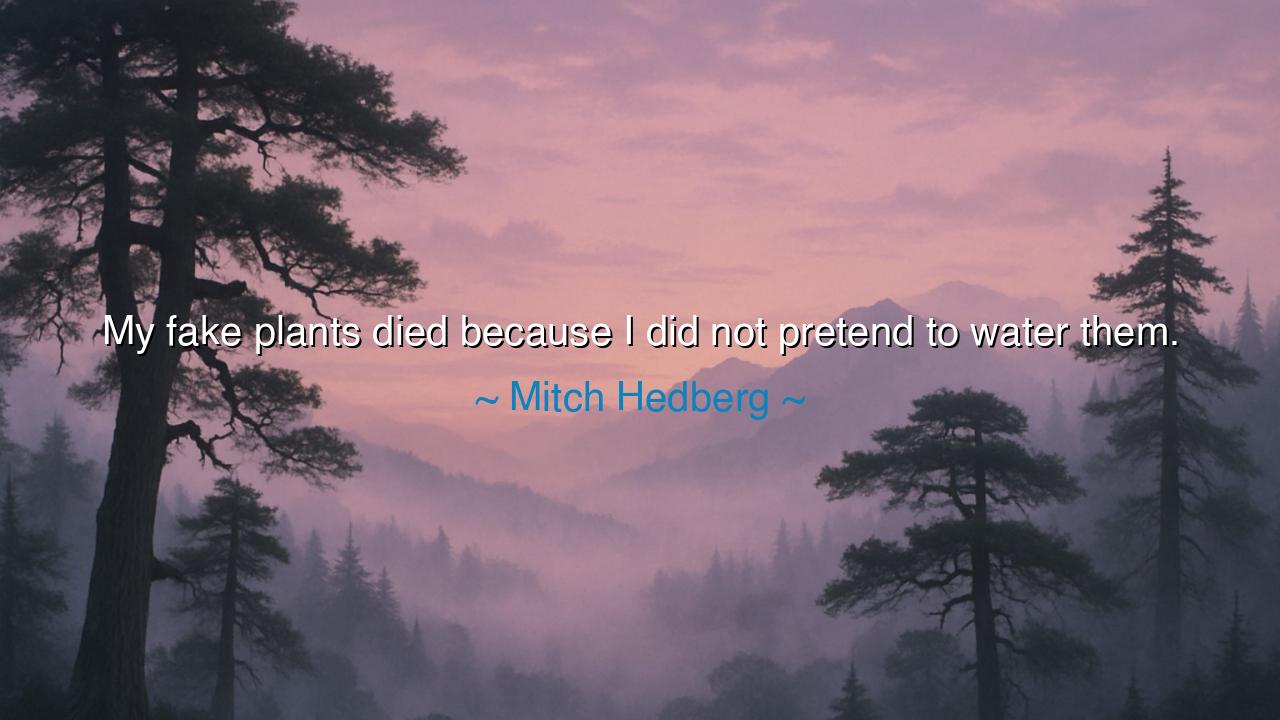
My fake plants died because I did not pretend to water them.






"My fake plants died because I did not pretend to water them." – Mitch Hedberg
In the vast expanse of human experience, there is much to be said about the art of pretending. The ancient philosophers often spoke of the power of illusion, recognizing that our minds, though bound to reality, often weave tales to navigate the complexities of life. Mitch Hedberg, in his characteristic wit, highlights a truth buried in the most mundane of circumstances: the failure to engage with the world, even in pretense, leads to decay. This simple, seemingly absurd statement about fake plants holds within it a profound lesson about care, attention, and the importance of illusion in sustaining the things we hold dear.
Consider the gardener of old, who tended to his crops with great care, knowing that the life of the plants was not merely in the soil, but in the act of nurturing them—watering them, talking to them, even singing to them. The plants, in turn, responded to the attention they received, growing strong and bountiful. If the gardener had simply neglected his plants, or worse, ignored them in silence, they would wither and fade away, regardless of the quality of the soil or the seeds planted. Hedberg's words echo the importance of attention in our lives—sometimes, the mere act of pretending to care, pretending to engage, is enough to keep something alive.
The idea of pretending itself is not foreign to the great minds of history. Take, for instance, the art of diplomacy in ancient Greece. Pericles, the great Athenian leader, often had to pretend harmony in times of political discord, giving the illusion of unity and strength even when the city was fraught with division. This act of pretense was not mere deception, but a strategy to maintain peace and order, to ensure the prosperity of the people. Similarly, in Hedberg's jest, pretending to water the fake plants is akin to the act of creating an illusion—sometimes, this illusion is the very thing that sustains the object of our focus.
Throughout history, the finest leaders and artists have understood that engagement, even in the form of pretense, can shape the outcome of their endeavors. Leonardo da Vinci, though deeply committed to the pursuit of knowledge, often found his greatest inspirations in the games of imagination, in the mere act of pretending that the world was a canvas upon which he could create whatever he envisioned. This playful attitude allowed him to transcend the boundaries of conventional thought and create works that have endured for centuries. In much the same way, pretending to water a fake plant, though an absurd action, symbolizes the importance of nurturing the things we care about, even in the absence of their true life.
Hedberg's statement is not merely a humorous reflection on the nature of fake plants, but a metaphor for how we interact with all aspects of life. In our relationships, our ambitions, and our goals, there are times when the mere act of engaging, even if it seems futile or insignificant, has a profound impact on the growth and development of those pursuits. The fake plants represent the things in life that require attention, care, and sometimes, the illusion of care. If we neglect them entirely, even pretending to nurture them, they wither away—yet, if we simply continue to show up, to act as though we care, we might be surprised at the life that flourishes.
The lesson to be drawn from this witticism is simple yet powerful: attention, no matter how small or fleeting, is necessary for the survival of the things we hold dear. Sometimes, it is not the depth of our care, but the consistency of our presence that ensures growth. Like the gardener who tends to his plants, like the leader who creates unity through the illusion of peace, we too must engage with the things that matter in our lives, even when the results seem uncertain or the efforts seem small. For in the act of pretending to care, we may find that we are, in fact, nurturing something far greater than we realize.
Let us take this wisdom into our lives and reflect: What are the fake plants in our own world? What relationships, ambitions, or dreams have we allowed to wither because we stopped pretending, stopped engaging, stopped nurturing them? The path forward is to act—to pretend when necessary, to give attention to the things that matter, and to trust that even the smallest effort can lead to a flourishing of life. Just as a fake plant requires only the illusion of care to survive, so too do the fragile pursuits in our lives need attention, no matter how small, to keep them from fading away.






AAdministratorAdministrator
Welcome, honored guests. Please leave a comment, we will respond soon